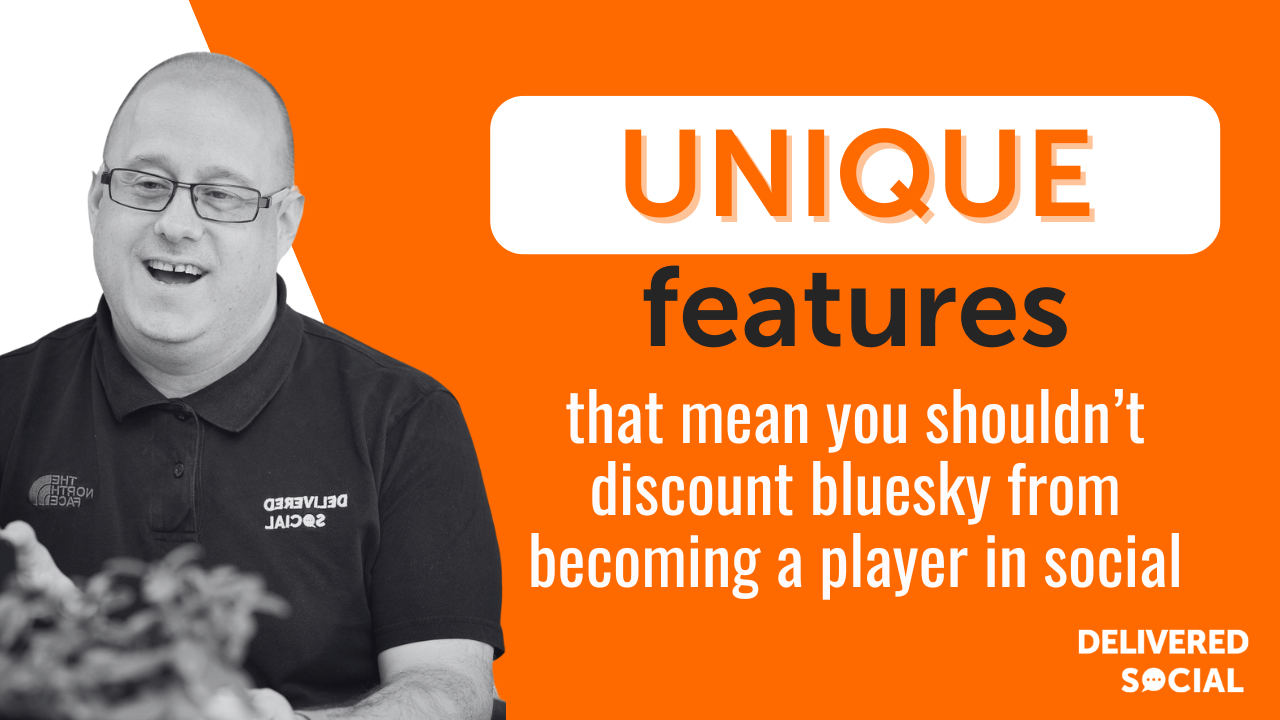
Bluesky is gaining attention as a new social platform built with transparency and user control in mind. Unlike other networks, it offers tools that give users more say in what they see and how they interact. Whether you’re curious about its decentralised structure or looking for alternatives to mainstream apps, understanding Bluesky’s unique features can help you decide if it’s the right fit. This article breaks down seven specific elements that set Bluesky apart, so you can get a clear picture of what it offers—without the hype. Each feature focuses on practical use, privacy, and user choice.
Decentralized Architecture
Bluesky runs on the AT Protocol, a system that does not rely on one central server. This structure allows users to manage their own data instead of handing it over to one company. Unlike older platforms that store everything in one place, Bluesky spreads control across many servers. This approach gives people more freedom in how they use their accounts.
With this setup, users can choose different service providers without losing access to their content or followers. It also means no single company can delete an account or remove posts without user consent. Accounts remain active even if a provider changes or shuts down. This control helps build trust since individuals decide where and how their information is stored.
The AT Protocol also supports portable identity. Users can move between services while keeping the same username and social graph. That makes switching networks easier and less risky for those who depend on digital connections for communication or business.
Another key part of this model is open moderation tools. Instead of one set of rules from above, communities can apply their own filters and standards. People have more say in what appears on their feed, helping them shape the kind of experience they want.
These elements make Bluesky stand out from common social apps that often limit choice and transparency. By giving power back to users through decentralised systems, Bluesky opens up new ways to connect online without giving up privacy or control.
This focus on flexibility and user autonomy highlights why Bluesky unique features matter when comparing modern social platforms today.
Algorithmic Choice
Bluesky offers users the ability to select how their feed works. Instead of one fixed timeline, people can pick from different content algorithms. This gives more control over what shows up first and how posts appear. Each user can decide what kind of updates they want to see most often.
Some may prefer a feed sorted by recent activity. Others might choose one that highlights popular or trending topics. There is also an option to follow feeds built by other users or developers. These custom feeds focus on specific themes or types of posts, helping people stay updated on subjects they care about.
For those with technical knowledge, Bluesky allows building completely new algorithms using its open protocol system. This means anyone can design a feed based on their own rules and share it with others. It removes limits set by a single company and creates space for more choices. This feature stands out among bluesky unique features because it puts power in the hands of users instead of platforms. Many social apps push content based on hidden formulas that can’t be changed or reviewed by regular users. Bluesky takes another route by making these systems visible, flexible, and shareable.
People who want less noise in their timelines can find filters that reduce off-topic content. Others looking for more variety can explore feeds made by trusted sources within the network community.
By offering algorithmic choice as part of its core setup, Bluesky supports personal control over digital experiences without imposing a single default method on all users.

Portable Identity
Bluesky gives users the ability to carry their identity across apps that run on the same network protocol. This means your username and profile don’t stay tied to one platform. If you start using one app and decide to switch, your handle, followers, and data can move with you.
This system works through a protocol called AT Protocol. It separates your online identity from any single company or service. Instead of creating a new account every time you join a new app, you keep the same name and information across all apps built on this shared system. For example, if someone uses App A today but wants to try App B tomorrow—both powered by AT Protocol—they won’t need to start over. Their existing identity transfers with them. That includes who they follow, who follows them, and their posts.
This approach gives people more control over their social presence. They don’t lose access or history when changing platforms within the same ecosystem. Social connections remain intact even after switching services.
Unlike older platforms where usernames often belong to the company running the app, Bluesky lets users link their identity to domains they own. For instance, someone could use a domain like “yourname.com” as their handle instead of relying on a platform-issued name.
Among all Bluesky unique features, portable identity stands out because it reduces dependence on any single provider. People no longer need to commit fully to just one tool or risk losing access if that service shuts down or changes direction.
It also helps developers create new tools without requiring users to rebuild their profiles each time. This lowers barriers for both creators and participants while keeping social structures consistent across apps in this open network model.
Federated Networking
Bluesky runs on a system called federation. This means users can join different servers, also known as instances, while still being able to connect with others across the full network. Each server operates independently but stays linked to the broader platform. This setup allows people to choose where they want their data and content stored.
One key benefit of this model is that each server can follow its own rules. Moderators on one server can create specific guidelines that fit their community without affecting other servers. These local controls help manage discussions based on what users expect in that space. It also gives communities more choice over how they engage online.
Unlike centralised platforms where one company makes all decisions, Bluesky spreads control across many groups. A person or group can run a server and set policies for it, including content filtering or account moderation. Other servers may allow different types of posts or user behaviour based on their choices.
This structure helps reduce reliance on a single authority. If someone disagrees with how one server works, they can move to another without losing access to contacts or conversations from the larger network. The ability to switch between hosts while keeping your identity and followers adds flexibility.
Another part of this system is identity portability. You don’t need to start over if you change servers; your account information moves with you. That way, people keep their social connections even if they leave one host for another.
Among all of Bluesky’s unique features, federated networking stands out as a method that supports freedom of choice while maintaining broad communication between users across different spaces within the same platform ecosystem.
Open-Source Development
Bluesky uses open-source development. This means anyone can view, use, or suggest changes to its code. The platform shares its structure with the public. Developers from different places can take part in shaping how it works. This helps users trust the system because they can see what it does and how it runs.
By allowing outside input, Bluesky avoids closed systems that limit control to one group. Instead, coders and engineers from various backgrounds can share feedback or submit improvements. These updates go through review before becoming part of the project. This method supports fast problem-solving and steady progress.
One of the bluesky unique features is this level of community involvement. It gives users more than just a place to post content—it offers a way to take part in building the tool itself. People who use Bluesky also help improve it over time by reporting issues or offering better ways for it to function.
This approach also lowers barriers for developers who want to build new tools that connect with Bluesky’s network. Since everything is open, third-party apps or services can interact with its framework without asking for special access or waiting for permissions. The source code being public also reduces hidden risks. If something harmful enters the system, others can spot and fix it faster than in closed setups where only internal teams have access.
As more people join the effort, changes happen based on what users need most instead of what benefits a few decision-makers. That makes progress more balanced across different user groups.
Bluesky’s model supports fairness by making sure no single company has full control over decisions that affect everyone using the platform.
Custom Moderation Tools
Bluesky gives users and community managers the power to decide what content they want to allow or block. Unlike many other platforms, Bluesky does not rely on one central system for content control. Instead, it lets people shape their own experience by using tools that match their needs.
Users can follow moderation services made by others or create their own filters. These services help reduce unwanted content without removing full access to a post unless someone chooses to hide it. This approach supports personal choice instead of relying on fixed rules set by a single company.
Communities can also manage how discussions happen within their groups. They can choose which moderation service best fits their goals or even build one from scratch. This helps different groups maintain order while keeping control over what is shown or hidden.
The system works through labels and filters. Labels tag posts based on certain traits, like spam or sensitive material. Filters then use these tags to decide what shows up in a feed or reply thread. People can change these settings at any time, giving them full control over what they see.
Another part of this setup is the ability to delegate trust. Users don’t have to make every decision themselves—they can choose trusted moderators whose judgment they respect. This saves time and makes it easier for people who prefer not to manage everything alone.
These custom options give more freedom than traditional social networks offer today. They also support safer online spaces without forcing everyone into the same ruleset.
This kind of flexibility stands out among bluesky unique features because it balances safety with independence—two needs often seen as opposites on most platforms today.
Highlighting Bluesky Unique Features
Bluesky gives users more control over their social experience. Unlike other platforms that manage feeds using hidden formulas, Bluesky allows people to shape what they see. Users can choose from different feed options created by the community or build their own. This lets individuals decide which topics, users, or content types matter most to them.
Another part of how Bluesky operates is through decentralised control. The network runs on a protocol called AT Protocol, which separates the platform from the app. That means no single company owns everything. Different apps can connect to the same network and follow shared rules without central oversight. This approach limits outside influence and gives users more freedom in how they engage online.
One of the bluesky unique features is identity portability. On many apps, if someone leaves or gets banned, their profile disappears with them. Bluesky works differently. A user’s handle and followers stay connected even when switching between services based on the same protocol. That keeps relationships intact and reduces reliance on one provider.
This model also supports long-term access without forcing people into closed systems. Developers can build tools around it without needing approval from a single authority figure or company boardroom.
Bluesky’s structure encourages open participation while protecting personal choice at every level—what you read, who you follow, and where your data lives all depend on your own preferences rather than a preset formula controlled by one group. These elements combine to give users more say in how social media functions for them day-to-day—not just what shows up in their feed but how their profile exists across platforms that use the same base system built for open use and flexible design choices rather than fixed paths set by corporate goals alone.
Unlocking the Future of Decentralised Social Platforms
As we’ve explored, Bluesky is redefining what a social platform can be through its innovative and forward-thinking approach. With features like decentralised architecture, portable identity, and algorithmic choice, users gain more control over their online experience. The platform’s commitment to open-source development and customizable moderation empowers communities to thrive on their own terms. These bluesky unique features position it as a powerful alternative in the evolving digital landscape. By embracing transparency, user autonomy, and federation, Bluesky sets a new standard for how social networks can operate—securely, ethically, and with scalability in mind.
Interested In Working Together?
Introducing Delivered Social. We’re The Most-Rated Digital Agency In Surrey & Hampshire – We’ve Got To Be Doing Something Right.
Delivered Social is a digital marketing agency with one mission—to help businesses grow. We’re famous in Guildford and Portsmouth for our social clinics. We believe in free advice. We build lasting relationships because our team prides itself on being helpful, which our clients appreciate.
If you are looking for a new website or an agency to manage your social media presence, we can help.
If you need something slightly different, here's a super handy list of all our services, or you can always email us.























